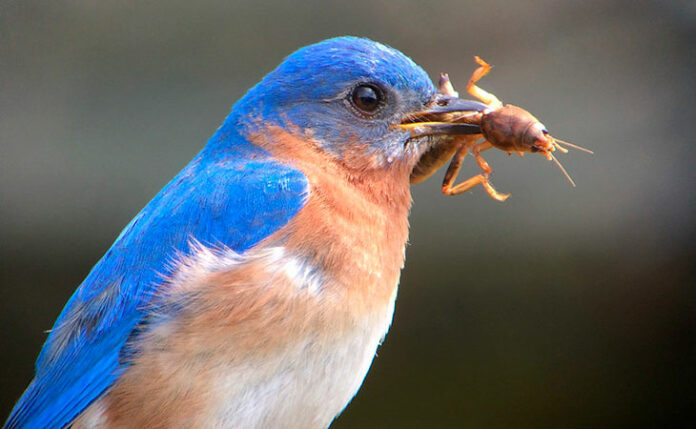What do bluebirds eat – Bluebirds are loved by many because they are associated with happiness, joy, and the arrival of spring. If you want bluebirds to come to you, you must find the right food to catch their attention.
North America has three kinds of bluebirds: Eastern bluebirds (commonly known), Western, and Mountain. These bluebirds may look a bit different from each other, but they all eat the same things.
Eastern bluebirds have a blue body and a peach-coloured chest, while Western bluebirds are slightly brighter blue. Mountain bluebirds are entirely blue and do not have any light orange feathers. These birds are small and about the hand size. All three types have their unique features and are easy to recognize.
Curious to know what do bluebirds eat? If yes, here are the foods that these little birds enjoy in their natural habitat and even in your backyard.
What Do Bluebirds Eat In The Wild And The Nature
Here are the foods that bluebirds like to eat when they are in nature or the wild:
Bugs: Bluebirds enjoy eating various types of bugs, including insects like mosquitoes and termites.
Earthworms: Bluebirds also feast on earthworms, which they find in the soil.
ollusks: Another food source for natural bluebirds is mollusks, such as snails or slugs.
Although bluebirds are not as interested in seeds as some other bird species, they occasionally indulge in certain berries as part of their diet.
Sometimes, bluebirds may eat reptiles like lizards, frogs, salamanders, and small amphibians, although this is uncommon.
When it comes to berries, bluebirds mainly like wild berries such as holly, sumac, and hackberries; they also enjoy eating fruits from pokeweed and dogwood plants. If these native plants grow in your area, watch for bluebirds, as they will likely be found nearby.
Read More- Know Everything About Fish Eating Birds
In The Yard, What Do Bluebirds Eat?
You can do a few things to attract bluebirds to your yard and see these adorable and colourful birds. One is to create a bird-friendly garden, which may attract the insects that bluebirds like to eat.
When bluebirds are in the yard, they usually search for food like ants, termites, and spiders. They might also look for grubs and snails near plants that have been recently watered. Additionally, bluebirds eat flying insects such as mosquitoes and moths.
When bluebirds eat bugs, their diet consists of the following:
- 32.4% moth larvae and butterfly
- 30.7% beetles
- 25.6% grasshoppers and crickets
- 11.3% spiders
Bluebirds will happily eat some of the berries if you have berry bushes in your yard. They are particularly attracted to wild berries like hackberries and sumac.
However, they also enjoy other berries, such as cranberries, raspberries, blackberries, elderberries, and chokecherries.
If you want to attract bluebirds or any other birds to your yard, it is important to practice organic gardening. Using insecticides may decrease the number of pests and bugs, but it will also reduce the food source for birds that rely on insects and spiders.
Keeping a corner of your yard where grubs, spiders, or snails can thrive is beneficial. This way, bluebirds will be able to find food in your yard.

What To Feed Bluebirds At The Feeder?
If you are wondering what to feed bluebirds at the feeder, their favourite food is mealworms. Bluebirds are attracted to the extra protein provided by mealworms, and if you offer them, the birds will come to your feeders.
To start, you can give live mealworms until the bluebirds become regular visitors to your feeder. Once they are used to it, you can switch to dried mealworms with a longer shelf life.
Bluebirds lay beautiful sky-blue eggs; having their nest in your yard is a joy. You can provide a bluebird-friendly nesting box to attract them, and if you are lucky, you may even see 3-5 baby bluebirds hatch.
Bluebirds usually nest during the spring and summer. When they are producing eggs, they require extra calcium. You can help by adding crushed eggshell bits to their food, boosting their calcium.
To attract bluebirds to your feeder, having a clean birdbath nearby is another trick. Bluebirds like shallow baths since they are small birds, and about 1/2 inch of water is usually sufficient for them.
It is worth noting that birds, including bluebirds, prefer running water, so adding a fountain feature to your birdbath can make it even more enticing for them.
Foods That Bluebirds Ignore
There are certain foods that bluebirds do not eat. Unlike some other backyard birds, they are not curious about birdseed. While they might occasionally eat sunflower pieces, they generally have songbird blends and ignore millet.
During Nesting Time, What Do Bluebirds Eat?
Mother bluebirds require additional protein and nutrition during nesting time, just like their growing babies. While bluebirds have a consistent diet throughout the year, they tend to eat more protein and insects during the breeding season.
When birds are nesting, they require more protein in their diet. This is because they share food with their newborns, and a protein-rich diet gives the babies extra nourishment. This helps the babies become more independent and promotes their growth, making them stronger and healthier.
During nesting, a significant portion of the bluebird diet, around two-thirds, consists of insect protein. If you have bluebirds visiting your yard, providing live mealworms in the feeder is a good idea. Ensure the feeder has deep and high sides to stop the running of wiggly worms.
What To Feed Baby Bluebirds?
When it comes to baby bluebirds, they are adorable. If you successfully attract bluebirds to nest in your yard, it is important to provide the mother bird with calcium in ground eggshells form.
The baby bluebirds grow rapidly and have big appetites, usually requiring both parents to provide them with enough food.
The parents feed them worms, grubs, mealworms, insects, and sometimes berries.

What To Feed Bluebirds In The Winter?
During the winter, bluebirds enter their non-breeding season. In colder regions of the United States, bluebirds migrate south to find warmer weather. Some bluebirds travel as far as 2,000 miles to reach their wintering grounds, with Mexico being a common destination during the winter months.
In milder regions of North America, bluebirds may choose to stay in the same area during the winter. It is important to note that bluebirds may require additional nutrition during these colder months, so providing them with bluebird food is a good idea.
If bluebirds remain in your yard in the winter season, you can offer them berries, peanut butter, mealworms, and suet, and they might also be interested in sunflower seeds when it is chilly outside. These foods are rich in calories and fat, which help the birds stay nourished and energized throughout winter.
Some Questions
What do bluebirds eat the most?
Bluebirds are insectivores, meaning they eat insects for most of their diet. Insects make up about 68% of their diet. Some of the most common insects that bluebirds eat include crickets, grasshoppers, beetles, ants, spiders, and earthworms.
What else do bluebirds eat?
In addition to insects, bluebirds will also eat berries, fruits, and seeds. This is especially true during the winter months when insect populations are lower. Some of the berries that bluebirds eat include sumac, holly, dogwood, pokeweed, and hackberries. They will also eat small tree and vine fruits like grapes and cherries.
How can I attract bluebirds to my yard?
If you are interested in attracting bluebirds to your yard, you can do a few things. First, give them a source of food. You can do this by planting berry bushes or vines or putting out a feeder containing mealworms, suet, or sunflower hearts. You can also put out a water source for them to drink from.
What are some predators of bluebirds?
Bluebirds have several predators, like snakes, cats, black bears, raccoons, and other birds, like house sparrows. You can help protect bluebirds from predators by keeping your yard free of tall grass and weeds and by giving them a safe place to nest.

















